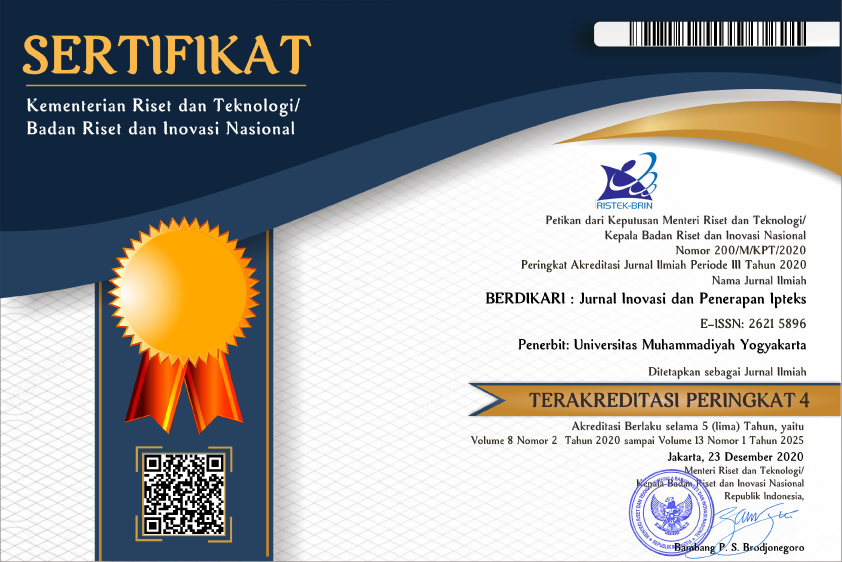Pencegahan Stunting Pada Era New Normal di Puskesmas Sekaran
DOI:
https://doi.org/10.18196/berdikari.v10i2.13240Keywords:
Cadre, Stunting, Covid-19, PosyanduAbstract
Based on the Nutrition Status Monitoring (PSG) data in 2019, the prevalence of stunting in Indonesia was recorded at 27.67 percent. This figure is still above the standard set by WHO, which should not exceed 20 percent. The prevalence of stunting in Central Java showed an increase from 2014 to 2017, while the prevalence of stunting in Semarang City was 21.0%. It is feared that the increased prevalence will continue to increase due to the low or even non-functioning posyandu in the new normal era. This condition causes the skill capacity of the cadres in anthropometric measurements to decrease. This was triggered by the concerns of most mothers about the transmission of Covid-19. This service aims to maintain and increase the activity capacity of posyandu cadres in the new normal era, especially in preventing stunting. The implementation method was carried out by counseling about stunting, training and assisting cadres in anthropometric measurements, filling out and interpreting the Towards Health Card (KMS), preparing stunting books and posyandu menus. Stages of activities include preparation, implementation, and evaluation of the program. The results of the service showed an increase in knowledge of cadres before and after being given education by 53%. In addition, there was a significant difference in the knowledge of the health care providers before and after the intervention.
References
Aryastami,N.K; Tarigan,I. 2017. Kajian Kebijakan dan Penanggulangan Masalah Gizi Stunting di Indonesia. Badan Litbang Kementerian Kesehatan RI.
Dinas Kesehatan Provinsi Jawa Tengah. 2019. Rencana Strategis Dinas Kesehatan Provinsi Jawa Tengah Tahun 2018-2023. hal 60
Emily B. 2018. Social Media Use to Tramsfer Knoeledge into Practice and Aud Interaction in Higher Education. International Journal Education and Development and Communication Technology.14(2)
Farudin, A. 2011. Perbedaan Efek Konseling Gizi Dengan Media Leaflet Dan Booklet Terhadap Tingkat Pengetahuan, Asupan Energi Dan Kadar Gula Darah Pada Pasien Diabetes Melitus Di RSUD DR. MOEWARDI SURAKARTA‟. 70, p. 13.
Fista Utami. 2018. Pengaruh Edukasi Gizi Seimbang Menggunakan Media Video Terhadap Pengetahuan dan Sikap pada Remaja di SMP Negeri 4 Kota Cimahi. Litbang kemenkes.go.id. 2018
Hafid, F. et al. 2016. Manfaat Media Flipchart dan Spanduk dalam Perilaku Kesehatan 1000 HPK di Sulawesi Tengah The Benefits of Flipchart Media and Banner Toward Health Behavior the First 1000 Days of Life in Central Sulawesi‟. p. 2.
Kementerian Kesehatan RI. 2011. Pedoman Umum Pengelolaan Posyandu. Jakarta: Kementerian Kesehatan RI
Kementerian Kesehatan RI. 2020. Pelayanan Kesehatan Balita Pada Masa Tanggap Darurat Covid-19.Jakarta: Kementerian Kesehatan RI
Geraee N, Mohammad Hossein K, and Hamid Reza. 2015. Impact of Media Literacy Education on Knowledge and Behavioral Intention of Adolescents in Dealing with Media Messages According to Stages of Change. Journal of Advances in Medica Education & Professionaism. 2015
Ma’munah Malikatul.2015.Pengaruh Pendidikan Kesehatan Dengan Booklet Terhadap Pengetahuan Nutrisi Ibu Laktasi di Wilayah Kerja Puskesmas Ciputat Timur'Universitas Islam Negeri Syarif Hidayatullah Jakarta. 2015
Maulana. 2019.Promosi Kesehatan. Jakarta: EGC
Notoatmodjo, S. 2019. Promosi Kesehatan dan Perilaku Kesehatan.
Sinta. 2011. Pengaruh Pemberian Leaflet Terhadap Pengetahuan Ibu PKK Tentang Manfaat MP-Asi. Jakarta : Universitas Indonesia
Srimiyati. 2014. Pengaruh Pendidikan Kesehatan Menggunakan Booklet Terhadap Pengetahuan Dan Gejala Kecemasan Wanita Premenopause Tesis.
Stang S, Debora Selin, Suriah S, Sumarni Marwang, Haasanudin Ishak. 2020. The Effect of Educational Media Deveopment in Increasing Knowledge and Attitudes on Pregnancy Complications at Sayang Rakyat Hospital in Makassar. Journal of Medica Sciences.8(T2).
Titaley,C.R; Ariawan, I; Hapsari,D; Muasyaroh, A; Dibley, M.J. 2019. Determinants Of The Stunting Of Children Under Two Years Old In Indonesia: A Multilevel Analysis Of The 2013 Indonesia Basic Health Survey. Nutrients.11, 1106
World Health Organization. Global Nutrition Targets 2025: 2014. Policy Brief Series; (WHO/NMH/NHD/14.2); World Health Organization: Geneva, Switzerland
Downloads
Published
Issue
Section
License
Copyright
Authors retain copyright and grant BERDIKARI Jurnal Inovasi dan Penerapan IPTEK the right of first publication with the work simultaneously licensed under an Attribution 4.0 International (CC BY 4.0) that allows others to remix, adapt and build upon the work with an acknowledgment of the work's authorship and of the initial publication in BERDIKARI Jurnal Inovasi dan Penerapan IPTEK.
Authors are permitted to copy and redistribute the journal's published version of the work (e.g., post it to an institutional repository or publish it in a book), with an acknowledgment of its initial publication in BERDIKARI Jurnal Inovasi dan Penerapan IPTEK
License
Articles published in the BERDIKARI Jurnal Inovasi dan Penerapan IPTEK) are licensed under an Attribution 4.0 International (CC BY 4.0) license. You are free to:
- Share — copy and redistribute the material in any medium or format.
- Adapt — remix, transform, and build upon the material for any purpose, even commercially.
This license is acceptable for Free Cultural Works. The licensor cannot revoke these freedoms as long as you follow the license terms. Under the following terms:
- Attribution — You must give appropriate credit, provide a link to the license, and indicate if changes were made. You may do so in any reasonable manner, but not in any way that suggests the licensor endorses you or your use.
- No additional restrictions — You may not apply legal terms or technological measures that legally restrict others from doing anything the license permits.




